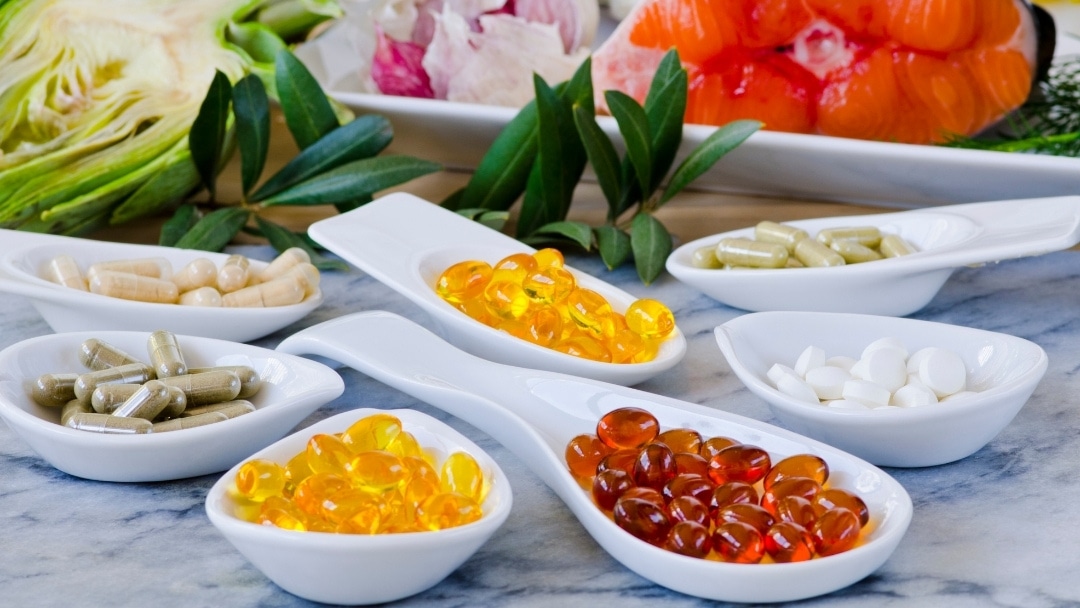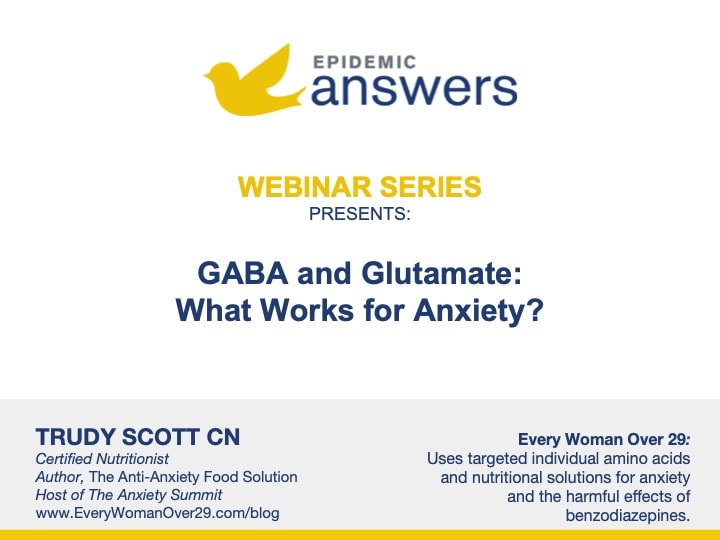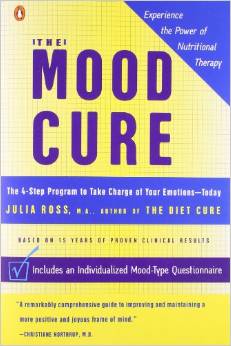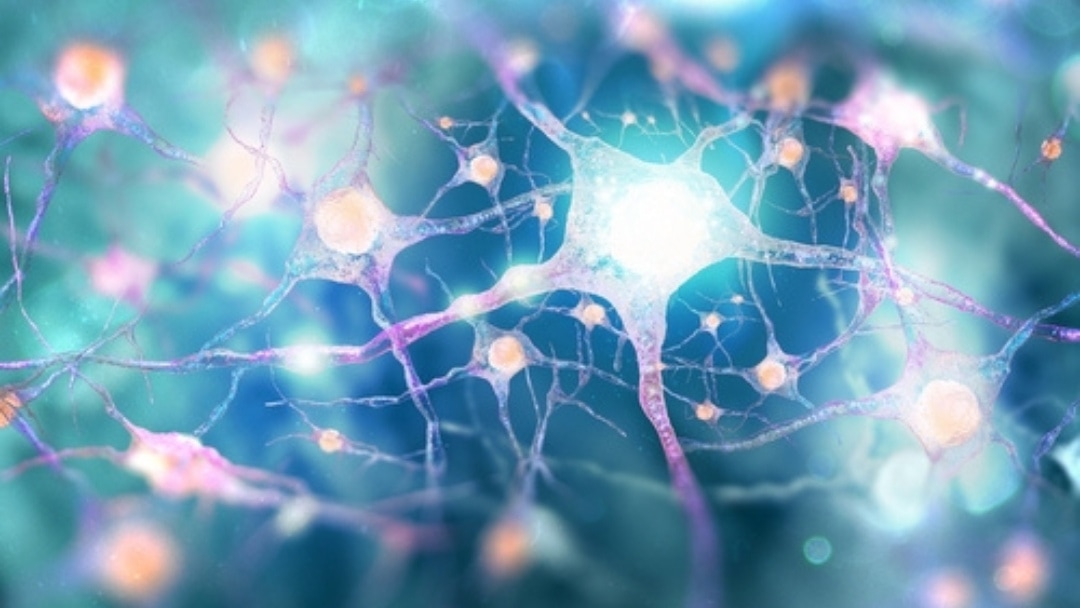Learn more about our recommendations for our top five supplements for anxiety: Magnesium, GABA, cannabidiol (CBD), vitamin D and probiotics; all of this is backed up by peer-reviewed medical literature that you’ll find below under “Sources & References”. Plus, you’ll find bonus tips about other ways to help lower symptoms of anxiety.
Magnesium
Magnesium is well known for its ability to promote feelings of calm and relaxation. It can also help improve constipation, lessen asthma symptoms, lower sensitivity to lights and sounds, and relieve muscle cramps and twitches. According to Carolyn Dean MD ND, author of The Mood Cure, most people (about 80%) are deficient in this mineral that is utterly necessary for the proper functioning of the body.
Magnesium can be taken orally or transdermally. If taken orally, work with a practitioner such as a naturopath or functional-medicine doctor to help you find the correct dose and form. The most common forms that these practitioners use are magnesium citrate, magnesium glycinate, magnesium malate and magnesium threonate. Magnesium citrate is helpful for relieving constipation and is taken to bowel tolerance (which may end up being over 1,000mg), while the other forms do not have this effect.
Magnesium sulfate in the form of Epsom salts is absorbed through the skin, such as in an Epsom salt bath, and it’s what makes this kind of bath so relaxing. Pour one cup of them into the bathwater or into a foot-soaking tub. You could also use Dead Sea salts, which contain magnesium chloride and which will also produce the same effect. There are also magnesium sprays, but these tend to be really itchy, so a bath or footsoak is often the better choice, especially for sensitive people. This transdermal option is often the best choice for children who cannot swallow capsules.
GABA
GABA, known as “Nature’s Valium”, is a calming neurotransmitter that acts in opposition to the excitatory neurotransmitter glutamate. Glutamate is often found in excess in the Standard American Diet (SAD) because:
- It becomes unbound from protein during processing
- The use of both natural and artificial flavors typically contain high amounts of glutamate
- Other foods, typically those with “umami”, like soy sauce, corn starch and anything “hydrolyzed” or “autolyzed”, have high amounts of free glutamate
GABA helps balance the effects of glutamate, and many people who take it often feel more calm and relaxed. If you’re having trouble going to sleep, GABA might help. As always, work with a practitioner such as a naturopath or functional-medicine doctor to help you find the correct dose and form. Some people have better success with the PharmaGABA form rather than the plain GABA form. You may also want to consider implementing a low-glutamate diet to see if symptoms of anxiety improve.
Cannabidiol (CBD)
Cannabinoids are compounds found within the cannabis plant that have been found to have a wide variety of health benefits. They have been increasingly studied in the past few years, and one that stands out is cannabidiol (CBD), which is a non-psychoactive endocannabinoid, meaning you won’t get high from taking it. CBD is highly anti-inflammatory and became well known after its use in halting or lessending seizures with the Charlotte’s Web brand.
In addition to this action, CBD has been shown to reduce symptoms of anxiety and to promote sleep. Some brands may contain minor amounts of THC, the endocannabinoid that makes you high, but most brands contain such a small amount of THC, if any, that there is very little risk of getting high or becoming addicted to CBD. Think of CBD as you would an anti-inflammatory such as vitamin C, and you can understand why it can also help to reduce pain, swelling and other symptoms of inflammation, which is a hallmark of any chronic illness or health condition.
As always, quality matters. High-quality brands are not cheap, but they are typically more effective; you get what you pay for. We recommend working with a knowledgeable practitioner that has access to pharmaceutical-grade nutritional supplements to guide you through dosing and brands.
Vitamin D
There has been an explosion of research in the past few years about the benefits of vitamin D. Sure, optimal levels of it can help you avoid a cold or the flu, but did you know it is also helpful in improving symptoms of neurological and mood disorders? That’s because it’s only recently been understand that these conditions are, in fact, symptoms of immune dysregulation. It used to be thought that the immune system didn’t extend into the brain, but with the discovery of microglia and other parts of the brain’s immune system, a whole world of understanding has opened up about the impact of the gut — the main center of the body’s immune system — on the brain’s health. So if the gut isn’t happy, the brain isn’t happy.
Most healthcare practitioners have been led to believe that 30 ng/dL is a “normal” level; however, “normal” is not the same as “optimal”. For best results, shoot for optimal levels of 80-100 ng/dL. We recommend working with a functional-medicine or naturopathic practitioner that can test levels of 25-hydroxyvitamin D and then guide your dosing to achieve optimal levels. In addition, because vitamin D is the “sunshine vitamin”, you’ll want to take it earlier in the day as it can interfere with sleep if taken later.
Probiotics
There has also been an explosion of medical research into the health-promoting effects of probiotics on health, including mental health. The reason for this profound impact is the gut-brain connection mentioned earlier as well as the fact that most neurotransmitters are made in the gut. Most people have been exposed to antibiotics through direct intake, maternal exposure before birth or the food supply. Antibiotics can lead to gut dysbiosis, a condition in which pathogens are allowed to thrive and the good germs (probiotics) can’t do their job so well; the immune system suffers.
Knowledgeable healthcare practitioners can help you discover which probiotics could be most helpful for you by conducting tests such as the Organic Acid Test (OAT) or a stool test. Typically, probiotics such as Lactobacillus and other strains may be prescribed. You can start with eating naturally fermented foods such as kim chi and sauerkraut as well as refrigerated probiotics at the health food store, which tend to be of higher quality. As with all supplements, start low and slow and build up over time to allow the body time to adjust.
Bonus Tips
There are plenty of ways of addressing anxiety without medication! Here are some other ideas to explore:
- Cut out sugar, as it is highly inflammatory, feeds pathogens and stresses the adrenal glands, making it harder to respond well to stress.
- Optimize blood sugar: Optimal fasting glucose levels should be between 70 and 85 mg/dl. People with anxiety may have reactive hypoglycemia, meaning blood glucose is below 70 mg/dl, and this can lead to irritability and mood swings, among other symptoms.
- Learn how food affects mood: Hidden food sensitivities may be contributing to symptoms, and you’ll want to try an elimination diet to see if this is the case.
- Consider removing high-glutamate foods with a low-glutamate diet: As mentioned above, glutamate is an excitatory neurotransmitter that works counter to the calming effects of GABA.
- Use breathing techniques, such as Buteyko breathing or pranayama breathing or even just breathing in slowly through the nose and out through the mouth to get out of a state of fight or flight.
- Learn more about Obstructive Sleep Apnea, which could be contributing to anxiety, especially if you snore or are a mouth breather.
- Learn more about resolving sleep issues. A lack of good sleep can most definitely affect a person’s mood!
- Try acupuncture: Despite having tiny needles poked into the skin, most people report feeling extremely relaxed after one of these body-energy balancing sessions.
- Try craniosacral therapy: People with sleep problems and anxiety often feel much better after one of these sessions; you may want to see one of these therapists on a regular basis.
- Look into EMDR: This therapy can be extremely helpful for those with trauma, PTSD and anxiety.
- Have a vision evaluation done by a developmental optometrist: Vision isn’t the same as “do you have 20/20 vision”; it’s how the brain processes what it sees. Faulty vision contributes to stress, and vision therapy can correct it.
- Learn about auditory therapy: There may be certain frequency ranges that are too loud, while some may be inaudible. Faulty audition contributes to stress.
- Have primitive reflexes checked: Programs such as Rhythmic Movement, Brain Balance, Brain Gym, Masgutova Neurosensorimotor Reflex Integration (MNRI) and Quantum Reflex Integration use reflex integration techniques to properly rewire the brain to the body. People with anxiety often have retained reflexes, especially the Moro reflex, which leads to being in a state of constant fight or flight.
- Consider neurofeedback: This therapy trains the brain to create new neural pathways to reduce brain wave combinations that produce anxiety and other symtpoms.
- Check out mind, body and spirit practices: Meditation, prayer, reiki, the Emotional Freedom Technique and other techniques, when practiced regularly, can reduce anxiety.
- Spend more time outside, especially in green spaces. Research shows that it helps!
- Do cardiovascular exercise once a day if possible: Running, cycling, walking or other forms of exercise produce endorphins that can reduce anxiety. Bonus points if you break a sweat!
- Look into other potential contributors to the total load of stressors.
Still Looking for Answers?
Visit the Epidemic Answers Practitioner Directory to find a practitioner near you.
Join us inside our online membership community for parents, Healing Together, where you’ll find even more healing resources, expert guidance, and a community to support you every step of your child’s healing journey.
About Maria Rickert Hong CHHC
Maria Rickert Hong is a Co-Founder of, and the Education and Media Director for, Epidemic Answers, the 501(c)3 sponsoring non-profit of The Documenting Hope Project.
She is a former sell-side Wall Street equity research analyst who covered the oil services sector at Salomon Smith Barney and Lehman Brothers under Institutional Investor #1 ranked analysts. Later, she covered the gaming, lodging & leisure sector at Jefferies & Co. and Calyon Securities. She quit working on Wall Street when her first son was born.

Prior to working on Wall Street, she was a marketing specialist for Halliburton in New Orleans, where she also received her MBA in Finance & Strategy from Tulane University.
She is the author of the bestselling book Almost Autism: Recovering Children from Sensory Processing Disorder and the co-author of Brain Under Attack: A Resource for Parents and Caregivers of Children with PANS, PANDAS, and Autoimmune Encephalitis. Maria is also a Certified Holistic Health Counselor. Her work can be found on EpidemicAnswers.org, DocumentingHope.com, Healing.DocumentingHope.com, Conference.DocumentingHope.com and MariaRickertHong.com
Still Looking for Answers?
Visit the Epidemic Answers Practitioner Directory to find a practitioner near you.
Join us inside our online membership community for parents, Healing Together, where you’ll find even more healing resources, expert guidance, and a community to support you every step of your child’s healing journey.
Sources & References
Bayer, J.K., et al. The Cool Little Kids randomised controlled trial: population-level early prevention for anxiety disorders. BMC Public Health. 2011;11:11.
Bergamaschi, M.M., et al. Cannabidiol Reduces the Anxiety Induced by Simulated Public Speaking in Treatment-Naïve Social Phobia Patients. Neuropsychopharmacology. 2011 (36), 1219–1226.
Beyer, K.M.M., et al. Exposure to neighborhood green space and mental health: evidence from the survey of the health of Wisconsin. Int J Environ Res Public Health. 2014 Mar 21;11(3):3453-72.
Bitsko, R.H., et al. Epidemiology and Impact of Health Care Provider-Diagnosed Anxiety and Depression Among US Children. J Dev Behav Pediatr. 2018 Apr 24.
Blessing, E.M., et al. Cannabidiol as a Potential Treatment for Anxiety Disorders. Neurotherapeutics. 2015 Oct; 12(4): 825–836.
Bonnot, O., et al. Children and adolescents with severe mental illness need vitamin D supplementation regardless of disease or treatment. J Child Adolesc Psychopharmacol. 2011;21(2):157-61.
Bora, S.A., et al. Regulation of vitamin D metabolism following disruption of the microbiota using broad spectrum antibiotics. J Nutr Biochem. 2018 Jun;56:65-73.
Boyle, N.B., et al. The Effects of Magnesium Supplementation on Subjective Anxiety and Stress-A Systematic Review. Nutrients. 2017 Apr 26;9(5):429.
Bravo, J.A., et al. Ingestion of Lactobacillus strain regulates emotional behavior and central GABA receptor expression in a mouse via the vagus nerve. Proc Natl Acad Sci U S A. 2011 Sep 20;108(38):16050-5.
Breier, A.B., et al. The GABAA/benzodiazepine receptor: implications for the molecular basis of anxiety. J Psychiatric Res. 1990;24 Suppl 2:91-104.
Camilleri, M. Serotonin in the gastrointestinal tract. Curr Opin Endrocrinol Diabetes Obes. 2009 Feb;16(1):53-9.
Cohen-Cline, H., et al. Access to green space, physical activity and mental health: a twin study. J Epidemiol Community Health. 2015 Jun;69(6):523-9.
Costello, E.J., et al. 10-year research update review: the epidemiology of child and adolescent psychiatric disorders: II. Developmental epidemiology. J Am Acad Child Adolesc Psychiatry. 2006 Jan;45(1):8–25.
Darling, A.L., et al. Association between maternal vitamin D status in pregnancy and neurodevelopmental outcomes in childhood: results from the Avon Longitudinal Study of Parents and Children (ALSPAC). Br J Nutr. 2017 Jun;117(12):1682-1692.
Kelly, J.R., et al. Breaking down the barriers: the gut microbiome, intestinal permeability and stress-related psychiatric disorders. Front Cell Neurosci. 2015 Oct 14;9:392.
Korpela, K., et al. Maternal Fecal Microbiota Transplantation in Cesarean-Born Infants Rapidly Restores Normal Gut Microbial Development: A Proof-of-Concept Study. Cell, 2020.
Li, X., et al. Effect of Fluoride Exposure on Anxiety- And Depression-Like Behavior in Mouse. Chemosphere. 2019 Jan;215:454-460.
Lionetti, E., et al. Gluten Psychosis: Confirmation of a New Clinical Entity. Nutrients. 2015 Jul 8;7(7):5532-9.
Lydiard, R.B. The role of GABA in anxiety disorders. J Clin Psychiatry. 2003;64 Suppl 3:21-7.
Memon, A., et al. Association between naturally occurring lithium in drinking water and suicide rates: systematic review and meta-analysis of ecological studies. British Journal of Psychiatry. 2020 Dec; 217(6): 667-678.
The GABA system in anxiety and depression and its therapeutic potential. Neuropharmacology. 2012 Jan;62(1):42-53.
Essential elements in depression and anxiety. Part I. Pharmacol Rep. 2014 Aug;66(4):534-44.
Nuss, P. Anxiety disorders and GABA neurotransmission: a disturbance of modulation. Neuropsychiatr Dis Treat. 2015; 11: 165–175.
Papagianni, E.G., et al. Cannabinoid Regulation of Fear and Anxiety: an Update. Curr Psychiatry Rep. 2019 (21): 38.
Rook, G.A., et al. Microbiota, immunoregulatory old friends and psychiatric disorders. Adv Exp Med Biol. 2014;817:319-56.
Rosenber, E.C., et al. Cannabinoids and Epilepsy. Neurotherapeutics. 2015 Oct; 12(4): 747–768.
Sartori, S.B., et al. Magnesium deficiency induces anxiety and HPA axis dysregulation: modulation by therapeutic drug treatment. Neuropharmacology. 2012 Jan;62(1):304-12.
Savage, K., et al. GABA-modulating phytomedicines for anxiety: A systematic review of preclinical and clinical evidence. Phytother Res. 2018 Jan;32(1):3-18.
Shannon, S., et al. Cannabidiol in Anxiety and Sleep: A Large Case Series. Perm J. 2019;23:18-041.
Skelley, J.W., et al. Use of cannabidiol in anxiety and anxiety-related disorders. J Am Pharm Assoc. Jan-Feb 2020;60(1):253-261.
Warner, B.B. The contribution of the gut microbiome to neurodevelopment and neuropsychiatric disorders. Pediatr Res. 2019 Jan;85(2):216-224.
Yang, B., et al. Effects of regulating intestinal micobiota on anxiety symptoms: A systematic review. General Psychiatry. 2019; 32: e100056.
Resources
Books
Bock, Kenneth. Brain Inflamed: Uncovering the Hidden Causes of Anxiety, Depression, and Other Mood Disorders in Adolescents and Teens. Harper Wave, 2021.
Brogan, Kelly. A Mind of Your Own: The Truth About Depression and How Women Can Heal Their Bodies to Reclaim Their Lives. Harper Thorsons, 2016.
Dean, Carolyn. The Magnesium Miracle. Ballantine Books, 2017.
Greenblatt, James M. Integrative Medicine for Depression: A Breakthrough Treatment Plan that Eliminates Depression Naturally. FriesenPress, 2019.
Greenblatt, James M. (ed.) and Brogan, Kelly (ed). Integrative Therapies for Depression: Redefining Models for Assessment, Treatment and Prevention. CRC Press, 2019.
Greenblatt, James M. and Grossman, Kayla. Nutritional Lithium: A Cinderella Story: The Untold Tale of a Mineral That Transforms Lives and Heals the Brain. CreateSpace Independent Publishing Platform, 2016.
Louv, Richard. Last Child in the Woods: Saving Our Children From Nature-Deficit Disorder. Algonquin Books, 2008.
Ross, Julia. The Mood Cure: The 4-Step Program to Take Charge of Your Emotions–Today. PenguinLife, 2003.
Scott, Trudy. The Antianxiety Food Solution: How the Foods You Eat Can Help You Calm Your Anxious Mind, Improve Your Mood and End Cravings. New Harbinger Publications, 2011.
James Greenblatt MD Webinars for the Great Plains Laboratories
Adolescent Self-Injury And Suicide Prevention
Amino Acid Precursors In The Treatment Of Depression And Anxiety
How Gut Bacteria Affects Mood, Anxiety, And Weight- Research And Clinical Implications
Integrative Medicine For Mood And Anxiety Disorders
Integrative Medicine For OCD And Anxiety Disorders
Integrative Medicine For The Treatment Of Mood Disorders
Low Dose Lithium For The Treatment Of Mood, Behavioral, And Cognitive Disorders
Neuroactive Peptides From Common Foods Contribute To Psychiatric Disorders
Nutritional Risk Factors In Predicting Suicide Risk
Nutritional Support For Antidepressant Withdrawal
Understanding The Role Of Amino Acids In The Treatment Of Mental Health
Utilizing Nutritional Strategies With The Use Of Antidepressants




